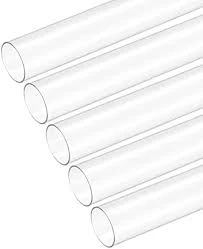Nov . 08, 2024 21:03 Back to list
6 inch pvc irrigation pipe
Understanding 6-Inch PVC Irrigation Pipe Benefits and Applications
Irrigation systems play a vital role in modern agriculture, ensuring that crops receive the necessary water to thrive. Among the various components that contribute to efficient irrigation, pipes are essential for transporting water from its source to the fields. One widely used option in irrigation systems is the 6-inch PVC (Polyvinyl Chloride) irrigation pipe. This article explores the benefits and applications of 6-inch PVC irrigation pipes, highlighting why they are preferred by many agricultural professionals.
The Advantages of PVC Pipes
1. Durability One of the primary benefits of 6-inch PVC pipes is their robust nature. Unlike metal pipes, PVC does not rust, corrode, or decay over time. This resistance to degradation extends the lifespan of the pipe, reducing the need for frequent replacements. For farmers and agricultural managers, this translates into lower maintenance costs and fewer interruptions in water supply.
2. Lightweight and Easy to Handle PVC pipes are significantly lighter than their metal counterparts. This characteristic simplifies transportation, handling, and installation, requiring less labor and time during set up. Farmers can easily maneuver the pipes around their fields, ensuring efficient layout for the irrigation system.
3. Smooth Interior Surface The smooth interior of PVC pipes minimizes friction loss, allowing water to flow freely and steadily. This feature ensures efficient water delivery, reducing the amount of energy required for pumping systems. Consequently, farmers can achieve better irrigation coverage while conserving energy and reducing costs.
4. Cost-Effectiveness When compared to other types of irrigation pipes, such as those made from metal or concrete, PVC pipes are generally more affordable. The cost savings, combined with their longevity and reduced maintenance requirements, make them an attractive investment for farmers looking to optimize their irrigation systems.
5. Resistance to Chemicals PVC pipes are resistant to most agricultural chemicals, making them suitable for transporting not only water but also various fertilizers and pesticides. This flexibility in usage allows farmers to utilize the same piping infrastructure for multiple purposes, enhancing efficiency.
6 inch pvc irrigation pipe

Applications of 6-Inch PVC Irrigation Pipe
The versatility of 6-inch PVC irrigation pipes positions them as a fundamental component in various irrigation systems
1. Surface Irrigation For farmers utilizing surface irrigation methods, 6-inch PVC pipes can be employed to transport water from reservoirs to the fields. Their size allows for a significant volume of water to flow through, ensuring that large areas of land are adequately irrigated.
2. Drip Irrigation Systems In drip irrigation setups, 6-inch PVC pipes can serve as mainline pipes from which smaller lateral lines branch off. This configuration ensures that water is evenly distributed throughout the field, enhancing water efficiency and crop yields.
3. Sprinkler Systems Sprinkler irrigation systems often require robust pipe infrastructure to handle pressurized water. The 6-inch PVC pipe provides the necessary strength and flow capacity, making it an excellent choice for distributing water evenly across large agricultural areas.
4. Water Transfer Beyond irrigation, these pipes are commonly used for transferring water in various applications, such as moving water from one part of a farm to a storage tank or even using them in landscaping projects.
Conclusion
In conclusion, the 6-inch PVC irrigation pipe is an invaluable asset for modern agriculture. Its durability, cost-effectiveness, and versatility make it a preferred choice for transporting water in a variety of irrigation systems. As agricultural practices continue to evolve, investing in quality materials like 6-inch PVC pipes will undoubtedly contribute to sustainable and efficient farming practices, helping to secure food production for the future. Whether it’s for small-scale farms or large agricultural enterprises, understanding the benefits and applications of these pipes can lead to informed decisions that promote healthy crops and productive land.
-
Durable PP Rigid Sheet: Lightweight, Chemical Resistant Solutions
NewsAug.21,2025
-
PVC Grey Sheet for Extraction: Chemical Resistant & Durable
NewsAug.19,2025
-
Durable PVC Pipe Fittings for Plumbing & Irrigation Needs
NewsAug.18,2025
-
HDPE Steel Belt Reinforced Spiral Corrugated Pipe | High Strength
NewsAug.17,2025
-
HDPE Pipe Fittings: Durable, Leak-Proof Solutions
NewsAug.16,2025
-
Premium CPVC Sheet: High-Temp & Chemical Resistant Solutions
NewsAug.15,2025

